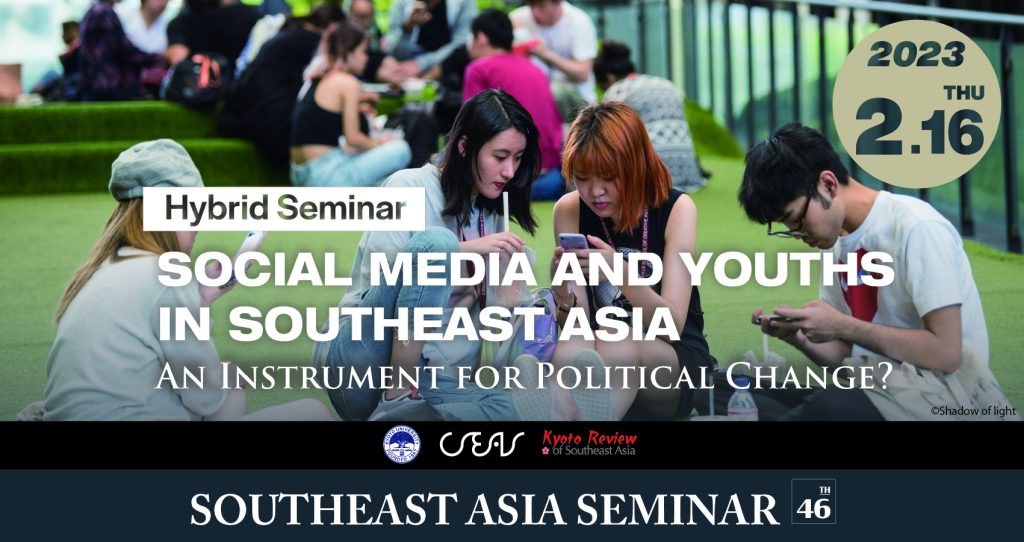
Date & Time: February 16th (Thu), 2023, 9:40-15:00 (JST)
Venue: Online/ 3F, Inamori Building, Center for Southeast Asian Studies, Kyoto University (Hybrid)
Registration: Please register via the link below by February 9th, 2023.
https://forms.gle/RyVgq6kJ3BvYGXea7
Registration is closed. Thank you.
Theme: Social Media and Youths in Southeast Asia: An Instrument for Political Change?
Concept:
Much of Southeast Asia’s political realm has long been dominated by authoritarian/semi-authoritarian regimes. Part of their success in maintaining power was the ability to control the mainstream media, shaping the way in which information is shared, circulated, and manipulated. For a long time, both print and broadcast media were exploited to serve a variety of political purposes of these states. Because of the need to justify their existence, the media became an important component in guaranteeing their political staying power. Alongside other powerful tools, such as education and state propaganda, the media has been used to strengthen political regimes, and this sometimes dampens or stokes political conflicts particularly when used to alienate those thinking differently from the regimes.
Over the past decades, however, Southeast Asia has changed immensely, as is evident by its impressive economic growth, the growing middle class and globalization – all of which have significantly transformed the way the media has acted and reacted to political developments. At the same time, Southeast Asia has encountered different types of political crisis, from military coups to relentless political violence. While political leaders have continued to rely on the controlled state media to shape information and to control discourses, the society, particular among its young members, has taken advantage of the growing variety of new media outlets to propagate their own information, and more importantly, to diminish the state’s control over information. This in turn is likely to diminish the state’s monopoly of power and can lead to political change.
This seminar discusses the rise of social media among Southeast Asian youths and its impact on the political landscape in this critical period. The key question is: How do Southeast Asian youths use social media as a tool for political change?
According to GWI (Global Web Index), across Southeast Asia, people aged 16 to 24 spend roughly 60 percent of their daily lives online, or an average of more than 10 hours per day using internet-connected devices. This means, they spend close to 3 full days using the internet every week. Young women spend even longer online than their male counterparts, nearly 10½ hours online each day. From Facebook, Twitter, Instagram, Telegram, to Clubhouse and Tiktok, these social media platforms are providing a useful venue that enables Southeast Asian youths to contest the state, particularly for the purposes of online mobilization and protests as well as encouraging critical discussions.
How has social media contributed to opening up society under an authoritarian environment? First, social media is relatively free and unrestrained, and decentralises sources of information, making the state’s control of the media increasingly irrelevant as a news source. Second, social media is increasingly used as a stage for political campaigns, as seen in the establishment of numerous political groups with specific agendas and clienteles, from the Philippines, Thailand to Myanmar and Vietnam. Third, social media reintroduces a participatory element that is fundamental to the process of democratisation. Participating in politics no longer exclusively means going to the polling station or joining street protests — which are absent or even illegal in some Southeast Asian states now. But it can be done online and possibly more effectively. Fourth, social media has become a forum for critical discussion, dealing with contentious issues that are otherwise unable to be discussed in the mainstream media. It has provided a useful platform for alternative media, which today offers information different from that provided by the state.
This year’s Southeast Asia Seminar invites six young/early-career speakers from Japan and selected Southeast Asian nations (basically, ASEAN-5)—Indonesia, Malaysia, the Philippines, Singapore, and Thailand–to present papers on the role of their respective countries’ youth in using social media to push for political change.
PROGRAM 
❐ Opening Remarks
9:40-9:50
Fumiharu Mieno, Dirtector of CSEAS
❐ Introduction
9:50-10:00
Pavin Chachavalpongpun, Chair of CSEAS Seminar
❐ Session One
10:00-10:20
Aries A. Arugay, University of the Philippines at Diliman, Philippines
“Mobilising yet Polarising: Social Media Youth Engagement in the 2022 Philippine Elections“
10:20-10:40
Haris Zuan, Institute of Malaysian and International Studies, Malaysia
“Potentials and Challenges of social media as an instrument for political change in Malaysia“
10:40-11:00
Saifuddin Ahmed, Nanyang Technological University, Singapore
“Fear of Missing Out and Online Political Engagement: The Case of Singapore“
11:00-11:20
Karl Ian Cheng Chua, Department of History, Ateneo de Manila University
11:20-12:00
Q&A
❐ Lunch Break
12:00-13:00
❐ Session Two
13:00-13:20
Surachanee Sriyai, Chiang Mai University, Thailand
”OppStruction: Opportunity Structure and its implications on the Pro-Democracy Movement in Thailand”
13:20-13:40
Irendra Radjawali, KEMITRAAN—Partnership for Government Reform
”Strength of Weak Ties: Youths and Digital Politics in Indonesia”
13:40-14:00
Atsuhiko Uchida, Otemon Gakuin University
“Political Participation Through Social Media by Japanese Youth“
14:00-14:20
Masaaki Okamoto, Professor, CSEAS
14:20-15:00
Q&A
Report:
The 46th Southeast Asia Seminar was organised as a hybrid meeting, online and in-person, on February 16, 2023. This year’s theme was “Social Media and Youths in Southeast Asia: An Instrument for Political Change?” This was a one-day seminar, bringing together six scholars from Southeast Asia and Japan. The original idea derived from the current phenomenon in Southeast Asia in which political contestation has continued to define politics of countries in this region. Under this circumstance, the emergence of social media has played an important role in shaping local politics. At the forefront of the online political activities are youths who have demanded political change for themselves for the future. With this concept in mind, this seminar seeks to understand the role of Southeast Asian youths in using social media as a tool for political change. The questions are how and if this attempt has been successful.
The structure of the seminar was designed to reflect six cases from Southeast Asia and Japan. We decided to take cases from five key Southeast Asian states, namely Indonesia, Malaysia, the Philippines, Singapore, and Thailand, plus Japan. In these countries, the rise of the youth movements has been evident. In their political mobilisation, they have utilised several social media platforms to rally support, to put across their demands and to initiate critical discussions on the political situation. It was our intention to engage with younger/early-career scholars to present their research on their respective countries.
A total of six key speakers were in invited to this seminar:
1. Haris Zuan, Institute of Malaysian and International Studies, Malaysia
(Potentials and Challenges of social media as an instrument for political change in Malaysia)
2. Aries A. Arugay, University of the Philippines at Diliman, Philippines
(Mobilising yet Polarising: Social Media Youth Engagement in the 2022 Philippine Elections)
3. Saifuddin Ahmed, Nanyang Technological University, Singapore
(Fear of Missing Out and Online Political Engagement: The Case of Singapore)
4. Irendra Radjawali, KEMITRAAN—Partnership for Government Reform
(Strength of Weak Ties: Youths and Digital Politics in Indonesia)
5. Surachanee Sriyai, Chiang Mai University, Thailand
(OppStruction: Opportunity Structure and its implications on the Pro-Democracy Movement in Thailand)
6. Atsuhiko Uchida, Otemon Gakuin University
(Political Participation through Social Media by Japanese youth)
We were fortunate to engage with members of CSEAS in this academic activity. Prof. Fumiharu Mieno, director of CSEAS, kindly graced the occasion by delivering an opening speech focusing on the origin and importance of the SEA Seminar. He also touched upon the many academic activities within the walls of CSEAS; a special highlight was on the Kyoto Review of Southeast Asia which would become an outlet to publish the findings of this seminar. After the director’s speech, Assoc. Prof. Pavin Chachavalpongpun, as chair of the SEA Seminar, explained the concept of this seminar and the objective of this academic endeavour. It is noteworthy that there were almost 100 people from 17 countries attending this event, both online and offline.
The seminar comprises of two sessions. The first session was moderated by Prof. Caroline Hau from CSEAS. This session concentrated on the first three countries: the Philippines, Malaysia, and Singapore. Dr. Karl Ian Cheng Chua, from the Department of History at Ateneo de Manila University, kindly served as the discussant. The first three cases offered various perspectives on the role of youths in using social media for their political demands. The key message in this first session was a question whether social media really served as an instrument for political change. Indeed, whether social media was conducive in the promotion of democracy has remained highly debatable.
In the second session, Assoc. Prof. Mario Ivan Lopez from CSEAS served as the moderator. The other three papers dealt with three remaining countries: Thailand, Indonesia, and Japan. Prof. Okamoto Masaaki from CSEAS served as the discussant. Similar to the first session, these three countries have their own unique story in regard to the connection between youths and social media. While in Thailand and Indonesia, youths have been active in online activism, this has not been the case of Japan. Speakers in this session doubted if the emergence of social media could really shift the political landscape. This was not to mention about a segment in the populace who may have remained inactive on social media. The other issue as reiterated during the discussion was the issue of Internet literacy.
During the discussions in both sessions, there were many interesting questions which deserved further research. Aside from the issue of Internet literacy, the fact that the state claimed its authorities over the borderless cyberspace raised a question of cyber sovereignty. The talk also paid attention to the issue of “the-state-strikes-back” tactic against the young population on the cyberspace. This talk involved the proliferation of fake news, the online infiltration of the state, the active activities of the political right wings in turning the democratic space on the Internet to serve their authoritarian approach. However, we missed out an opportunity to discuss the regional solidarity among youths in Southeast Asia and beyond, such as through the Milk Tea Alliance network.
The academic event on this topic was not limited only at CSEAS. The same panel was to be organised at King’s College, Cambridge University, organised by the Cambridge University Southeast Asian Society, on February 20, 2023. The panelists would include Assoc. Prof. Pavin, Haris Zuan, and a speaker from Singapore, Yeo Nee Win, who is a PhD candidate at King’s College London. This panel was a collaboration between CSEAS and Cambridge University. The panelists would focus on three countries: Thailand, Malaysia and Singapore.
Finally, all the papers presented at CSEAS would be published in the Kyoto Review of Southeast Asia, scheduled to be on September 1, 2023. The six papers will be translated from English into Japanese, Thai, Bahasa Indonesia, Filipino, Vietnamese and Burmese.
The 46th Southeast Asia Seminar was organised by a ten-member team including four senior researchers (Pavin Chachavalpongpun, Caroline Hau, Okamoto Masaaki, and Mario Ivan Lopez) and six young researchers (Hiroki Baba, Kisho Tsuchiya, Chika Yamada, Julie Ann de los Reyes, Takamichi Serizawa, and Wu Yunxi). The committee would like to express its sincere gratitude to the CSEAS staff who supported this seminar and made it a success, especially Masako Akedo, Motoko Kondo, and Yumiko Tsuchikura).
Pavin Chachavalpongpun
Chair of the 46th SEA Seminar
On behalf of the SEA Seminar Committee
Kyoto, February 17, 2023.

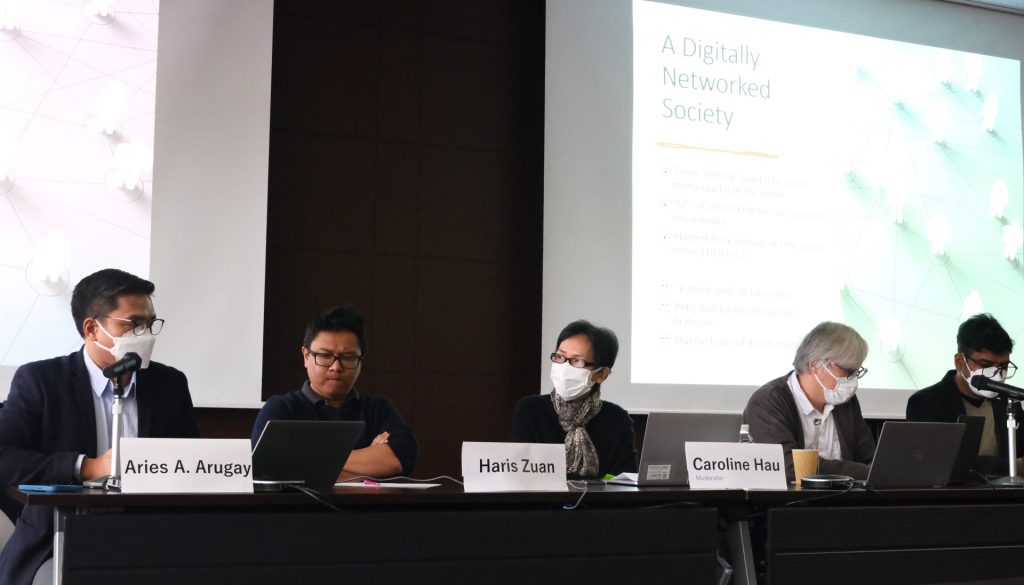
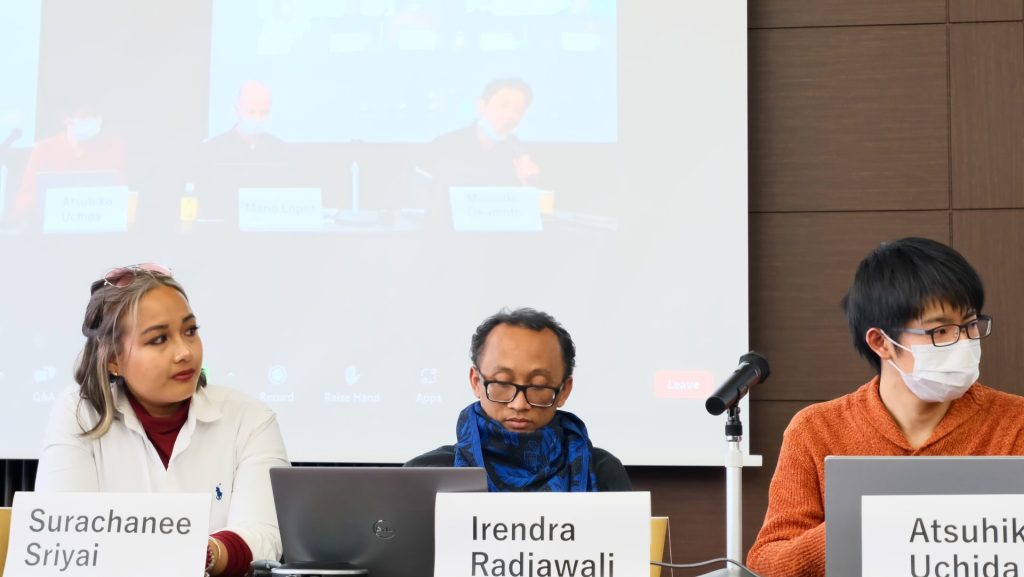
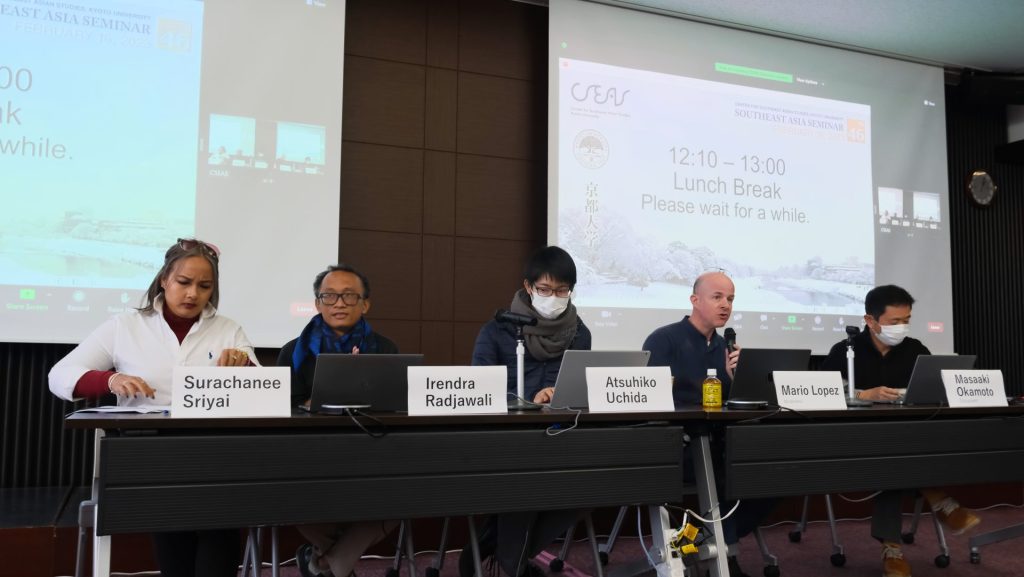
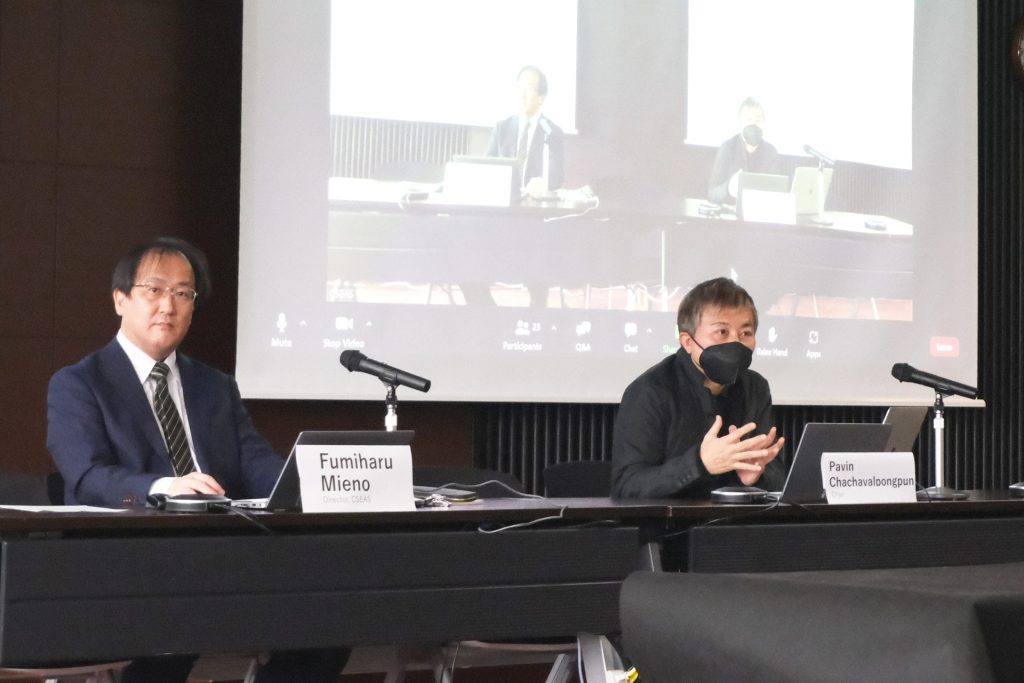
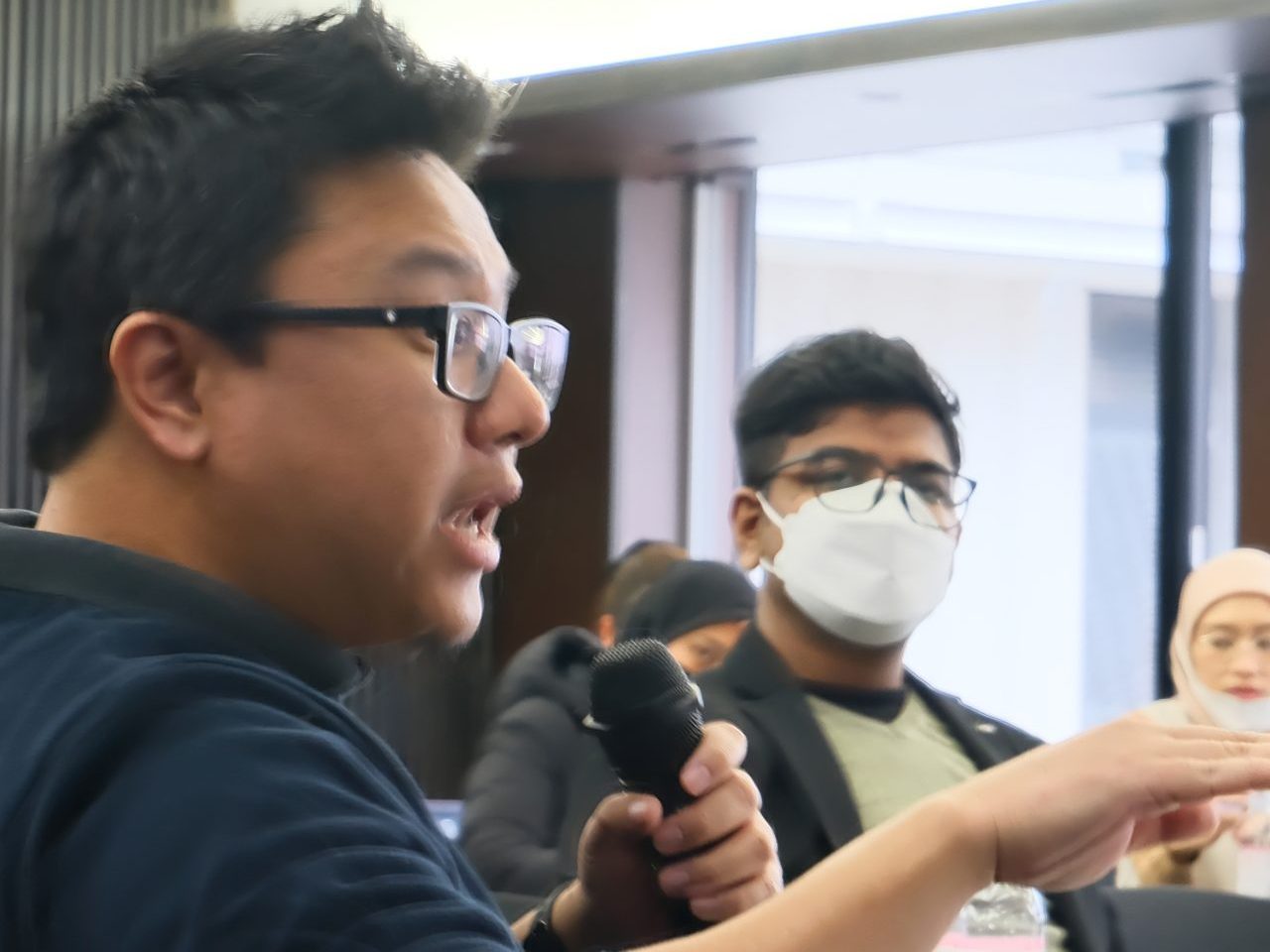

For participants who have small children, we can set up a temporary nursery room with a professional sitter during the seminar for free. If you are interested, please email to danjokyodo@cseas.kyoto-u.ac.jp
by Jan. 31. Please feel free to contact us.
*The deadline is extended: by noon, February 3rd (Fri.) !